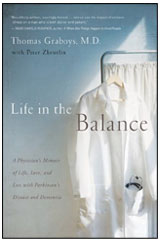Books |
Life in the Balance: A Physician’s Memoir of Life, Love, and Loss with Parkinson’s Disease and Dementia
Thomas Graboys
By
Published: Jan 01, 2008
Category:
Memoir
The résumé of Thomas Graboys — senior physician at Brigham and Women’s Hospital in Boston and associate clinical professor of medicine at Harvard Medical School — is 24 pages long.
In 1985, he was on the team of doctors who won the Nobel Peace Prize for their work with the International Physicians for the Prevention of Nuclear War.
He was a gifted tennis player and skier, a competitive marathoner.
His wife Caroline was loving and accomplished, his daughters all a father could wish for.
Then Caroline died of cancer.
A few years later, just as he was getting remarried, Dr. Graboys realized he had Parkinson’s Disease.
If you don’t know much about Parkinson’s, you may think it’s just trembling hands and involuntary muscle spasms. But it can be much more debilitating. "I often appear hunkered down," Graboys writes in Life in the Balance, "head bowed, shoulders slumped, my once-fluid body rigid, my once-graceful gait an old man’s shuffle."
And that’s just the part you see. Let him explain:
…the symptoms are global. No major function of mind or body has been spared. From visual perception, cognition, and speech to blood pressure, body temperature control, and sexuality, Parkinson’s permeates every aspect of my being.
Medicine? Behind him. Conversations? He suffers from slowness of thought (called bradykinesia) and dementia. Eventually he won’t recognize his loved ones. In the end he’ll lose control of his bodily functions.
This is a humiliating fate for anyone, and horrifying for a doctor like Tom Graboys. As a cardiologist, he was known for his vast knowledge, but even more for his bedside manner; he took the time to sit with patients, hear them out and explain what lay ahead for him. He had a great reputation. And out of that came a rock-hard sense of self-worth and connectedness. Or so it seemed. Parkinson’s changed everything.
Graboys wrote this memoir of his disease in part to help him hold on. It’s like shaving every day; it keeps the disease at bay. These days, he says, he sometimes writes the same note half a dozen times before he produces one that’s legible. But if he doesn’t struggle to do that….
So, with difficulty he does not describe, he tells the story of his last decade. Fainting on the morning of his wedding. Hiding his symptoms at work. Stunned when a colleague calls out, “Tom, who’s taking care of your Parkinson’s?” Facing, after three years, the need to stop seeing patients.
The medical passages are fascinating, and they will tell you what to look for in a doctor when the time comes for you or a loved one to confront what Graboys calls an “incurable life-altering disease.” And they will help you to think about death as a gift the dying give to the living, and about the very personal question of how you might want to die if you have a choice in the matter.
But the passages that took my breath away are about women — his two wives. I understood completely why Graboys was still grieving for his first wife, and always would. And I was in awe of Vicki, the second wife, who believed she was marrying a man whose only grief was emotional, and who quickly learned otherwise. You think you know something about commitment? About marriage? These passages are written in marrow.
It’s an odd thing. A man is struck down. He fights for his dignity. There’s no way he can defeat his disease. And yet, as long as he refuses to surrender, as long as he insists on his dignity, he has it.
You don’t need to be sick or have a sick person in your life to learn a lot from this book.
To buy “Life in the Balance” from Amazon.com, click here.
To read an excerpt, click here.


